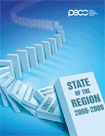State of the Region 2008-2009
 The US sub-prime mortgage crisis has turned into an international financial crisis but it is not yet certain that the ensuing global downturn will result in a severe recession in Asia. Asian economies have been hit as hard as industrialized economies by a sharp decline in financial asset prices and by the credit crunch. However, economic growth in greater China and parts of Southeast Asia remains positive, and many Asian governments have fiscal and monetary tools at their disposal to mitigate any further deterioration in their economies. This is not to say that there has been a “decoupling” of Asia from western industrialized economies. Indeed, the export outlook has dimmed considerably for major Asian economies, and the effects of falling export demand have already led to sharp employment losses. But Asian economies have relatively strong banking systems and large foreign reserves, which puts them in a much better position than in the 1997- 98 financial crisis. Even so, downside risks weigh heavily in the current forecast, which is predicated on the positive impact of the US and other liquidity injections taking effect in the first half of 2009, resulting in a modest recovery.
The US sub-prime mortgage crisis has turned into an international financial crisis but it is not yet certain that the ensuing global downturn will result in a severe recession in Asia. Asian economies have been hit as hard as industrialized economies by a sharp decline in financial asset prices and by the credit crunch. However, economic growth in greater China and parts of Southeast Asia remains positive, and many Asian governments have fiscal and monetary tools at their disposal to mitigate any further deterioration in their economies. This is not to say that there has been a “decoupling” of Asia from western industrialized economies. Indeed, the export outlook has dimmed considerably for major Asian economies, and the effects of falling export demand have already led to sharp employment losses. But Asian economies have relatively strong banking systems and large foreign reserves, which puts them in a much better position than in the 1997- 98 financial crisis. Even so, downside risks weigh heavily in the current forecast, which is predicated on the positive impact of the US and other liquidity injections taking effect in the first half of 2009, resulting in a modest recovery.
Contents
Impact of the Global Financial Crisis on the Asia Pacific Region and Economic Outlook
- T1: Real economic growth and increase in consumer prices for PECC economies, 2007-2010 (%)
- Section 1: Profile of Respondents
- Section 2: Regional Economic Outlook
- Section 3: Regional Economic Integration
- Section 4: Regional Institutions
- Section 5: APEC
A Composite Index of Economic Integration in the Asia Pacific
- Major findings of the Composite Index of Asia Pacific Economic Integration 2008
- Value of Composite Economic Integration Index and Ranking of Asia Pacific Economies, 1990 and 2005
- Technical Note
